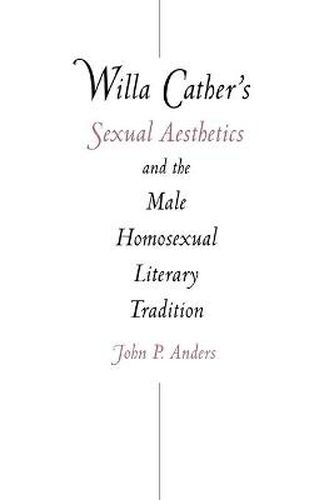Readings Newsletter
Become a Readings Member to make your shopping experience even easier.
Sign in or sign up for free!
You’re not far away from qualifying for FREE standard shipping within Australia
You’ve qualified for FREE standard shipping within Australia
The cart is loading…






Willa Cather is primarily known for her creation of strong female characters, yet her fiction often centers on male friendships. In this first full-length study of male homosexuality in Cather’s short stories and novels, John P. Anders examines patterns of male friendship ranging on a continuum from the social to the sexual. He argues that Cather worked in the familiar tradition of friendship literature inspired by classical and Christian texts and also borrowed from a homosexual legacy that is part of, yet distinct from, established literary traditions. In combining these two traditions Cather gave her fiction an unexpected depth and complexity. Anders argues that Cather’s artistic achieve-ment is distinguished by her sexual aesthetics, an elusive literary style inextricably associated with homosexuality. A homosexual ethos and eros helped Cather develop a sensitivity to human variation and a style to accommodate it; the range of male friendship and masculine desire in her fiction demonstrates this gift of sympathy and registers its sincerity. Although Cather’s wide play of feelings opened her to the imaginative possibilities of human differences, the subject of homosexuality does more than humanize her fiction. It also enabled her to refine her characteristically subtle and elusive style, becoming, in effect, the objective correlative of her art, dramatizing the diversity of human nature as it deepens the mystery of her work. John P. Anders is an independent scholar who lives in Lincoln, Nebraska.
$9.00 standard shipping within Australia
FREE standard shipping within Australia for orders over $100.00
Express & International shipping calculated at checkout
Willa Cather is primarily known for her creation of strong female characters, yet her fiction often centers on male friendships. In this first full-length study of male homosexuality in Cather’s short stories and novels, John P. Anders examines patterns of male friendship ranging on a continuum from the social to the sexual. He argues that Cather worked in the familiar tradition of friendship literature inspired by classical and Christian texts and also borrowed from a homosexual legacy that is part of, yet distinct from, established literary traditions. In combining these two traditions Cather gave her fiction an unexpected depth and complexity. Anders argues that Cather’s artistic achieve-ment is distinguished by her sexual aesthetics, an elusive literary style inextricably associated with homosexuality. A homosexual ethos and eros helped Cather develop a sensitivity to human variation and a style to accommodate it; the range of male friendship and masculine desire in her fiction demonstrates this gift of sympathy and registers its sincerity. Although Cather’s wide play of feelings opened her to the imaginative possibilities of human differences, the subject of homosexuality does more than humanize her fiction. It also enabled her to refine her characteristically subtle and elusive style, becoming, in effect, the objective correlative of her art, dramatizing the diversity of human nature as it deepens the mystery of her work. John P. Anders is an independent scholar who lives in Lincoln, Nebraska.